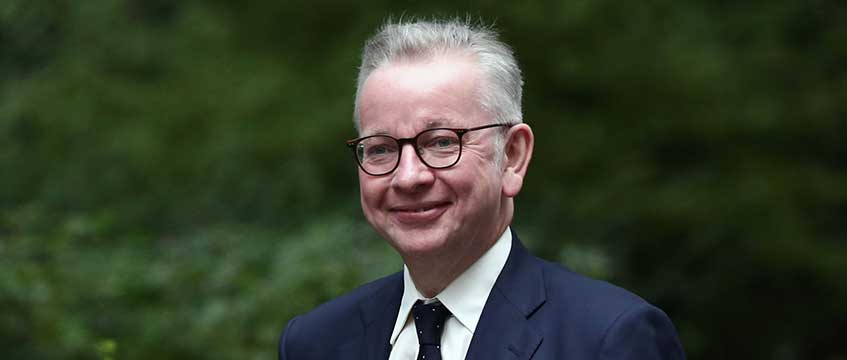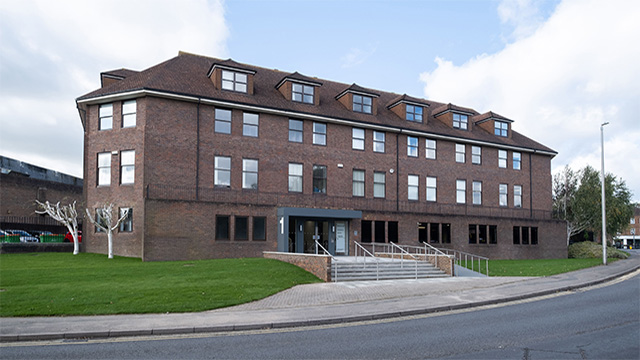Government commits £1.6bn to housing initiatives
The government has committed £1.6bn to deliver new homes as part of a long-term plan for housing launched today (24 July) by secretary of state for levelling up, housing and communities Michael Gove.
Gove (pictured) said £800m will be allocated from the £1.5bn Brownfield, Infrastructure and Land fund to unlock up to 56,000 new homes on brownfield sites. The Department for Levelling Up, Housing and Communities will also provide Homes England with £550m, which with income generated will mean a total investment of £1bn. It is also providing investments of £150m to Greater Manchester and £100m to the West Midlands.
Gove said his plans commit the government to “a new era of regeneration”, inner-city densification and housing delivery across England. Cambridge, Leeds and central London have each been earmarked for new schemes.
The government has committed £1.6bn to deliver new homes as part of a long-term plan for housing launched today (24 July) by secretary of state for levelling up, housing and communities Michael Gove.
Gove (pictured) said £800m will be allocated from the £1.5bn Brownfield, Infrastructure and Land fund to unlock up to 56,000 new homes on brownfield sites. The Department for Levelling Up, Housing and Communities will also provide Homes England with £550m, which with income generated will mean a total investment of £1bn. It is also providing investments of £150m to Greater Manchester and £100m to the West Midlands.
Gove said his plans commit the government to “a new era of regeneration”, inner-city densification and housing delivery across England. Cambridge, Leeds and central London have each been earmarked for new schemes.
In his speech today Gove said that in recent years the rates of housebuilding in rural areas have been greater than in urban areas in the UK.
“Failing to densify our inner cities means lower growth – with a 10% increase in our cities’ population potentially unlocking a £20bn increase in UK GDP.
“Failing to densify means longer commutes, a longer wait for a plumber or ambulance, and more vehicle journeys, leading to congestion and pollution. At present, only 40% of people living in our great cities can get into the city centre in 30 minutes by public transport, compared with over two-thirds of the population in comparable European cities.
“And we would not only be more productive, we would have an enhanced quality of life. People living and working in close proximity to one another is a key feature of the most creative, productive and attractive cities in the world, and in particular a feature of the most attractive parts of those cities.”
Gove also announced reforms to the planning system which he said will speed up new developments, “put power in the hands of local communities to build their own homes”, and unlock planning decisions. He launched a new fund of £24m to scale up local planning capacity, and an additional £13.5m to set up a new “super-squad” of experts to support large-scale development projects.
Commitment to Cambridge
Alongside the prime minister’s commitment to create a new urban quarter in Cambridge which will unlock the city’s full potential as a source of innovation and talent, Gove will focus on delivering the city’s “substantial infrastructure requirements”.
Gove said the government will deliver as much of the infrastructure and affordable housing as possible using land value capture, with the local area benefiting from the increase in land values that can occur when agricultural land is permitted for residential and commercial development.
A Cambridge Delivery Group, chaired by Homes England chair Peter Freeman and backed by £5m of public money, will be established to begin driving forward this project. It will also consider options for an appropriate delivery mechanism that will be needed to lead the long-term work on planning, land acquisition and engagement with developers.
In London, Gove launched a “Docklands 2.0” vision in the east of the capital for up to 65,000 homes across multiple sites at Thamesmead, Beckton and Silvertown. He said that the government will look at how it can ensure better transport connections from east to west, to “crowd in” local and private investment.
Gove has made £1m available to push forward work with mayor of London Sadiq Khan to consider releasing industrial land for housing.
Lessons in Leeds
The government will work with partners in Leeds to regenerate the city centre and explore how a West Yorkshire mass transit system could open up the city to more workers across the financial, digital and legal sectors.
This builds on the £40m already being provided by the government to the West Yorkshire Combined Authority to support development of the mass transit system.
The government will accelerate work in the centre of Leeds, with a focus on homes in the South Bank, Innovation Arc, and local and neighbourhood plans, potentially delivering up to 20,000 new homes on these sites over the next decade.
The government will also work with local authorities to adapt existing HS2 land safeguarded in Leeds city centre, supporting economic growth and housing delivery.
Planning reforms
Gove said a package of planning reforms would “unleash” building on underused sites in high-demand regions.
These will include a consultation on new permitted development rights, which he said would make it easier to convert larger department stores, space above shops and office space.
The amount developers pay in planning fees will rise to ensure planning departments are “better resourced”, Gove added.
A £24m Planning Skills Delivery Fund will target planning backlogs, while a new “super-squad” of leading planners and other experts will be tasked with working across the planning system to unblock major housing developments, underpinned by £13.5m in funding. The team will first be deployed in Cambridge, before looking at sites across eight investment zones in England.
To send feedback, e-mail akanksha.soni@eg.co.uk or tweet @AkankshaEG or @EGPropertyNews
Photo © Tayfun Salci/ZUMA Press Wire/Shutterstock











